EU3 begins talks to refer Iran to Security Council
European powers on Monday began drafting a resolution to have Iran referred to the UN Security Council next month over its nuclear work, dip...

European powers on Monday began drafting a resolution to have Iran referred to the UN Security Council next month over its nuclear work, diplomats said, after Russia and the West neared agreement in dealing with Tehran.
Britain’s Foreign Office said the resolution would call for an emergency meeting of the UN nuclear watchdog agency’s board in Vienna on February 2-3 to hold a referral ballot.
Iran’s resumption of research that could advance a quest for civilian atomic energy or bombs has sparked a flurry of Western diplomacy in pursuit of an International Atomic Energy Agency (IAEA) vote to send Iran to the Council for possible sanctions.
Diplomats said a London meeting on Monday of permanent Council members Britain, France, Russia, China and the United States, along with Germany, sought to bridge differences over Iran to enable an emergency IAEA board meeting and vote.
After Russia said it was “very close” to Western views on Iran, which favor diplomatic action to curb its atomic project, Germany, France and Britain began drafting a referral resolution to submit to the IAEA’s 35-nation board, an EU diplomat said.
“It’s short. It calls for (IAEA director-general Mohamed) ElBaradei to report Iran to the Security Council,” the diplomat said.
Moscow, with a $1 billion stake building Iran’s first atomic reactor, and Beijing, reliant on Iranian oil imports, have so far thwarted such a step by the IAEA board of governors. But EU foreign policy chief Javier Solana said on Monday he was confident China and Russia would back the EU in sending the issue to the Security Council.
President Vladimir Putin signaled a change when he said after talks with German Chancellor Angela Merkel in Moscow: “As for Russia, and Germany and our European partners and the United States, we have very close positions on the Iranian problem.”
It was the clearest hint yet that Moscow, which as Iran’s main energy partner wields the greatest potential foreign leverage over Tehran, was losing patience with the Islamic republic since it resumed nuclear fuel research last week.
There was no immediate comment from China. Beijing said last week that resorting to the Security Council might “complicate the issue”, citing Iran’s threat to hit back by halting snap UN inspections of its atomic plants. Diplomats said the resolution drafting was at an early stage and the EU was consulting with all IAEA board members to obtain as much unanimity as possible if it came to a vote.
Russia and China are veto-wielding permanent members of the Council, along with the US, Britain and France, and all five have nuclear arsenals. Diplomats with the EU trio of Germany, France and Britain that scrapped a moribund dialogue with Iran last week said Russia seemed to be edging into line with Western views but that China still looked more difficult to win over.
They said China’s resistance would be harder to overcome, although Beijing’s decision to join other permanent Council members in formally protesting against Iran’s move showed that the Chinese shared Western concerns. — Reuters
Photos


- 01
- 02
- 03
- 04
- 05





























